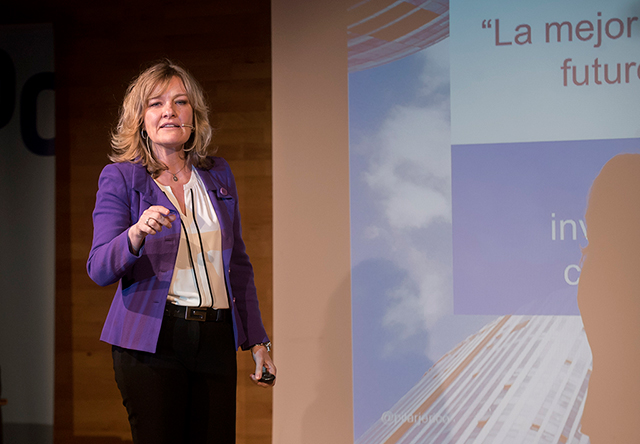Pilar Jericó , entrepreneur and author
Pilar Jericó is an entrepreneur and author with more than fifteen years’ experience in developing leadership and innovation. She holds a doctoral degree in Business Organization and has studied postgraduate courses on strategy, organizational behaviour and leadership at Harvard University, the University of California, Los Angeles (UCLA) and West Point. She is the author of books including No Fear: In Business and in Life, La nueva gestión del talento (The new management of talent), ¿Y si realmente pudieras?: la fuerza de tu determinación (And if you really could?: the power of your determination), Héroes cotidianos (Everyday heroes) and Poderosamente frágiles (Powerfully fragile). Jericó took part in the UOC Alumni conference held at Casa Encendida in Madrid on 2 March. She spoke about “The value of talent” to 180 graduates of the Universitat Oberta de Catalunya.
Pilar Jericó is an entrepreneur and author with more than fifteen years’ experience in developing leadership and innovation. She holds a doctoral degree in Business Organization and has studied postgraduate courses on strategy, organizational behaviour and leadership at Harvard University, the University of California, Los Angeles (UCLA) and West Point. She is the author of books including No Fear: In Business and in Life, La nueva gestión del talento (The new management of talent), ¿Y si realmente pudieras?: la fuerza de tu determinación (And if you really could?: the power of your determination), Héroes cotidianos (Everyday heroes) and Poderosamente frágiles (Powerfully fragile). Jericó took part in the UOC Alumni conference held at Casa Encendida in Madrid on 2 March. She spoke about “The value of talent” to 180 graduates of the Universitat Oberta de Catalunya.
What is your opinion on the 60,000 plus people who have graduated from the UOC and who believe in the value of lifelong learning?
I would say to them congratulations on their choice, because they chose an innovative institution which has also allowed them to learn in an innovative way. The UOC is innovative in its methodology and content.
The UOC believes in the importance of promoting and connecting people's talent. Do you think that there is a link between learning and the professional development of people?
Undoubtedly. Talent cannot be developed without learning, it is fundamental. We can do our job very well, but if we do not include the variable of continuing to learn, continuing to improve, before long we will end up at a standstill. Therefore, I would recommend continuing to learn to anyone wishing to develop their professional career, or even their personal career. It keeps us active and makes us happy.
Do you think there are sufficient ties between education and enterprise to truly promote talent?
Companies invest in training and it is a key factor for retaining and attracting talent, however we need to continue working on creating ties between enterprise and universities. There is still plenty of room for improvement and it is full of opportunities.
For you, what is talent?
It is the ability we have as people to achieve extraordinary results. All of us have a talent for something. The important thing is to identify where this talent lies: this will make us achieve excellence in our performance and feel fulfilled with what we do.
So... would you say that we are born with talent or have to develop it?
It is like leadership: few people are born with this ability, so it has to be developed. With talent there are some aspects which are innate, but very few: mathematical or physical ability, for example, but the rest have to be developed. Even if we have innate abilities, we still have to develop them.
How can a company retain talent?
Talent can be retained in various ways. An interesting project, which people want to share, is a major factor. After that, the bosses; leaders play a key role in talent wanting to stay. One aspect about talented people is that they are very free, so they will not be retained through money alone, but through emotional reward. And as we said earlier, training and learning are also key to motivating talent and for it to want to remain with us as a company.

Photo: José Luis Pindado
And to attract talent?
A good project, working on the good employer brand, knowing what I can offer as an employer that is different to what my competitor can offer in order to attract such talent. And we also need to be very good with social media because people who leave a company in a bad way can also have a major influence. We need to look after our employees and do it properly because this will also attract talent in the future.
How does one reward talent in an employee?
In many ways. In the old days, the easy way was through promotion, but nowadays, with such flat organization structures, this is difficult. So an interesting way to reward talent, apart from doing it verbally and saying something, is by offering new projects. Projects within the organization or with other companies that will challenge employees with talent. This is a way of rewarding them for the value they add to our company.
In the so-called fourth industrial revolution, in which it seems that robots will replace people in their jobs, what role will employees’ talent play?
The fourth revolution we are immersed in is fascinating and is going to mean that, more than ever, talent will be crucial in organizations. Because all the jobs that can be replaced will be replaced. Therefore, the talent that is going to have most added value now will be different to what it was in previous industrial revolutions, and even different to what was valued just 10 years ago. More general talent is being sought now, with the ability to be creative, take decisions, be decisive... the talent that was valued previously was the talent to do things very well within certain rules. Now the rules are less specific. Talent with the ability to take the initiative will be sought. Talent will be increasingly purer.
Can you tell us about your experiences in cutting-edge companies?
Two years ago, I had the opportunity to spend a couple of months in Silicon Valley. I was fortunate enough to spend time in one of these companies that are changing the world and the concept of talent. I was collaborating with Dropbox, Google and Facebook. Something that struck me in all of them was the type of leadership; not based on ego, but closer to the employees. I was also fascinated by how many of their policies were based on learning. They are companies that encourage learning. And the feeling that has stayed with me is that we have a long way to go in Spain to reach the level of these companies. But we are on the right road.
What is the ideal company?
There are no ideal companies [laughs]. What does exist, however, is a good company. It is generally true that a good company is one that people look forward to getting up and going to work at. And that is a major challenge in itself. Even the founder of Zappos, a very curious online shoe store in the USA, says that the key to knowing when to start a business is when the alarm clock goes off and you don't want to get out of bed: this is a good barometer. So, the ideal company is one the employees look forward to going to work at and one that clients want to work with.
Press contact
-
Editorial department

